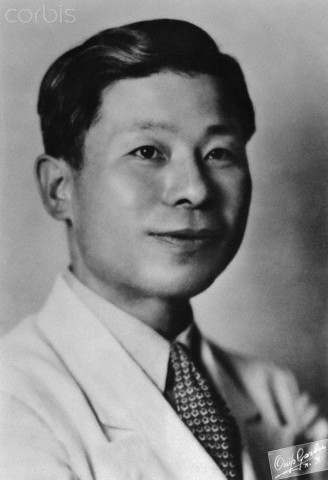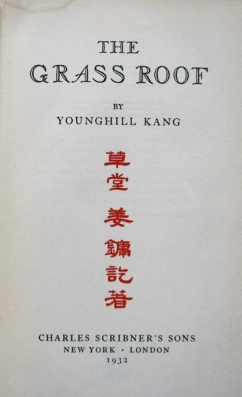Kang Younghill, the Pioneer of Asian American Literature

Kang Younghill was the first Korean-American writer and a pioneer of Asian American literature in the United States. Most acclaimed for his novels The Grass Roof and East Goes West, he carries the title “the father of Korean American literature.”[i] Born in Hamkyeong Province in northern Korea in 1898, Kang was educated in the Confucian tradition and later attended missionary schools.[ii] As a child, he showed exceptional intellectual promise in both Korean and Chinese classics. He graduated from Youngsaing School established by a Canadian Presbyterian missionary D.M. Macrae. When Korea was formally declared annexed by the Japanese government, Kang was forced to leave his hometown and traveled to Seoul in search of further education. In 1919, he was imprisoned by the Japanese government due to his involvement with the March 1st Independent movement, a nonviolent protest against the oppressive regime. In his autobiography, he reported that 50,000 Koreans were imprisoned and 7000 were killed.[iii] From 1920, Kang started assisting Mrs. H.H. Underwood in translating John Bunyan’s work into Korean. During this time, he also attempted to defect from Korea through Siberia but failed due to Japanese agents’ vigilant watch.[iv]
In 1921, through the aid and recommendation of a missionary, Kang sailed to San Francisco, arriving with only four dollars in his pocket. Kang initially wanted to become a physician, and received his Bachelor of Science at Boston University in 1925. Kang was a prodigious and curious reader, and ceaselessly read English, Korean, and Japanese texts during this time. He later wrote that he chose the field of science because he deemed it most serviceable to society, but he found himself discontent and unhappy in the laboratory. The only subject that gave relief and delight to him was literature and poetry.[v] Soon after graduating from Boston University, he decided to pursue a full-time writing career and obtained his Masters in English Literature at Harvard University in 1927. While taking classes at both Boston University and Harvard, he worked at numerous jobs to support himself. In 1929, he married Frances Stacy Keely, a Wellesley graduate and an American poet who encouraged Kang to write in English.

He became an editor for Encyclopedia Britannica and taught English Literature at New York University while working on his autobiography The Grass Roof. Thomas Wolfe, whom Kang befriended while at New York University, was impressed after reading parts of the book and took it to his own editor at Scribner’s. Soon after in 1931, Kang’s first book The Grass Roof was published. The Grass Roof is an autobiography of his life and the political situation of his time— the first part consists of his childhood and a vivid depiction of the Japanese annexation. The second part includes delineation of his immigration experience and issues he had concerning his identity. The book was translated into more than ten languages and received international approbation— his contemporaries such as Pearl Buck and Herbert George Wells particularly admired the book. In addition to his most prominent work, he translated Korean literature into English and wrote numerous book reviews in the New York Times on Asian culture. In 1933, he published a children’s book The Happy Grove based on his early life. That same year, Kang received a Guggenheim Fellowship in Creative Literature and travelled to Germany and Italy between 1933 and 1935.
In 1937, Kang wrote his autobiographical work East Goes West. Regarded his second most distinguished work, East Goes West deals with the intersection between the two cultures and how the disparate elements are understood through his lens. Written in the perspective of Han (representing Kang), the book provides a view of how urban American life was experienced by an Asian immigrant. Landing in New York with only four dollars in hand, Han struggles to support his studies and is never accepted in the US society. The book delineates how the protagonist yearns to find permanent home in the cosmopolitan immigrant subculture. A sharp social commentary as well as an autobiography, East Goes West is a unique work that both criticizes and explains American racism and alienation. [vi] At the same time, through his marriage with an American woman and his eventual acceptance of his new life in America, Kang showed how he evolved and learned to reconcile his identity as both American and Korean.
After spending some time in Europe, Kang was given U.S citizenship through a private bill in 1940, twelve years prior to the legal bill that granted American citizenship to Korean immigrants as a whole. The bill was a result of the collaborative endeavors of Kang’s fellow educators and supporters. He later translated Korean poetry with his wife Frances Keely Kang, taught literature in various institutions, and stayed engaged in his own writing projects. During World War II, Kang worked as an adviser to the US military and after the independence of Korea, Kang returned to Seoul and served as a professor in Seoul National University. Throughout his life, Kang received copious awards, which included two Guggenheim Fellowships, an honorary doctorate in literature from Korea University, the New School’s Louis S. Memorial Prize, and Le Prix Halperine Kaminsky Award. Frances Keely Kang died in 1970 and Kang Younghill died in 1972 due to a massive stroke.
Kang viewed himself as a cultural bridge between the West and the East, as reflected by his works and his life itself. As an immigrant, he never found a permanent niche in American academia or community. His works were forgotten by the end of his life, but in recent years Asian American scholars have rediscovered them, and see them as an important doorway into Asian American literature. Kang’s works mark the beginning of Asian American literature, and they provided a crucial venue for the Western world to view Asian culture.
Citation
[i]Deborah Madsen, Dictionary of Literary Biography: Asian American Writers (Farmington Hills, Mich: Gale, 2005), 159-162.
[ii] The official year of his birth is 1903, but most scholars concede that he was actually born on 1898. The ambiguity of the exact birth date was common among Koreans in his time.
[iii] Younghill Kang. East Goes West: The Making of an Oriental Yankee (New York: Kaya Production, 1997), 402.
[iv] Ibid., 403.
[v] Stan Kunitz and Howard Haycraft, eds. Twntieth Century Authors: A Biographical Dictionary of Modern Literature (New York: Wilson, 1945), 744.
[vi] Paul Lauter, ed. The Heath Anthology of American Literature: Volume D (Boston, MA: Wadsworth Publishing, 2013).
Written by: Soojin Chung